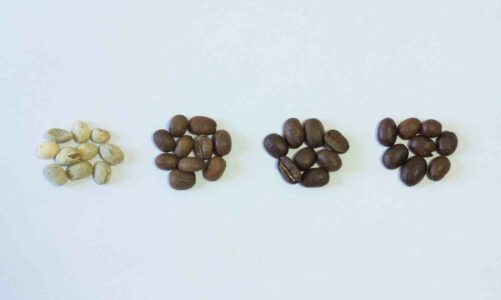Most people drink coffee for the caffeine kick, to get an energy boost, or because they are addicted to it. An average person will consume up to 3 – 7 cups of coffee per day which can amount to a lot of caffeine. If you don’t want the extra energy boost or can’t drink caffeine, thankfully there is decaf coffee.
What is the difference between decaf coffee and regular coffee? Decaf coffee and regular coffee are quite similar when it comes to texture and appearance. The major differences are that decaf coffee has no caffeine, more acidity, health benefits, and the taste.
Related article: Best decaf coffee 2022.
Decaf Coffee vs Regular Coffee Comparison
| Item | Decaf Coffee | Regular Coffee |
|---|---|---|
| Caffeine | 2 mg | 95 mg |
| Acidity | High | Low to Medium |
| Taste | Flat and weak (Bolster flavor with sugar) | Varies but flavorful and strong |
| Positive | No caffeine, health benefits, good substitute | Some health benefits, more energy, better taste |
| Negative | Bad for GERD, other health impacts, high acidity | Can cause heart problems, insomnia, stress |
In this article, you’re going to read more about what makes decaf coffee distinct, the benefits, and downsides of drinking decaf coffee.
What is Decaf Coffee
Decaf coffee, also known as decaffeinated coffee, is coffee without the majority of caffeine content. There are different ways in removing caffeine from coffee beans. One famous process of removing caffeine is using a solvent to “wash” the caffeine off the beans. This includes water, carbon dioxide, and organic solvents.
Some coffee drinkers would not notice the taste difference from a decaf coffee variation of their favorite regular coffee. But regular coffee drinkers would not only notice the taste difference, but also the lack of energy from the lack of caffeine.
Origins of Decaf Coffee
The process of decaffeinating coffee started in 1820 which was carried out by Friedlieb Ferdinand Runge. The first to commercialized decaf coffee was created by a German merchant named Ludwig Roselius in 1903. After observing that the coffee beans that were accidentally soaked in seawater still had the coffee flavor to them but without the caffeine content. He then proceeded to have the process patented in 1906.
Decaffeinating Process
In order to create decaffeinated coffee, different methods and processes must be followed. However, in recent years, local countries are finding new ways of modifying coffee plants to grow coffee beans with already low caffeine content.
In order to start the process of Decaffeinating, un-roasted coffee beans must be placed into water and left to soak. This allows the caffeine content to be washed off. Then there are three different steps that can be taken:
Liquid Carbon Dioxide
Another process that only uses natural components is Liquid Carbon Dioxide decaffeination. This one uses liquid carbon dioxide to break down the caffeine and remove it from the water and coffee bean mixture.
Chemical Decaffeination
The first process of decaffeination involves the use of Methylene chloride chemicals. This chemical is also used in ethyl acetate or paint removers. What happens in chemical decaffeination is that the chemical is added to the coffee and water blend. After that, water is then entirely removed using evaporation so that the caffeine content be removed but the flavor is still intact.
Swiss Water Process
The Swiss Water Process uses a charcoal filter to get rid of the caffeine without the use of any harmful chemicals. This process is simpler and safer compared to chemical decaffeination.
Recent Posts
How is Decaf Coffee Different?
By now you already know that decaf coffee is coffee that had its caffeine removed. That is the most obvious comparison between decaf coffee and regular coffee. Let’s take a look at the differences in a bit more detail:
Less Caffeine
Now, most people actually believe decaf coffee to have no caffeine in it, that is untrue. Decaf coffee will always contain traces of caffeine, but the amount is not enough to have any effect on the body as a regular coffee would.
According to the National Coffee Association – “Decaffeination removes about 97% or more of the caffeine in coffee beans.”
The content of caffeine in decaf coffee is around 2 mg compared to a regular coffee at 95 mg.
As you can see, there is a noticeable difference in caffeine content. If you were to drink 15 cups of decaf coffee in a day, you could feel some of the effects of caffeine, especially if you never consume caffeine.
More Acidity
It’s common to believe that decaffeinated coffee would not have as much acidity, but this couldn’t be far from the truth. Decaf coffee has higher acidity in every cup due to the type of coffee beans used. It is usually made with Robusta beans, and these beans have higher acidity than Arabica beans.
This isn’t necessarily a good thing either. Higher acidity can lead to a number of health problems including:
- GERD (Gastro esophageal reflux disease)
- Acid reflux
- Osteoporosis
- Increased Cortisol Levels
This is not to say that these effects will impact everyone, but it is important to point out as why is decaf different.
Health Benefits
When talking about the health benefits of decaf coffee and regular coffee, they should be taken with a pinch of salt. Each type of coffee has different benefits and each benefit can impact a person in different ways. It is also worth noting that both types of coffee also have negative health impacts as well.
The most obvious health benefit of drinking decaf coffee is for those who cannot consume caffeine for health reasons. Whether it is for blood or heart problems, there can be many reasons that people are forbidden to drink caffeine. No one wants to miss out on coffee, so decaf is the answer.
Decaf coffee has a number of properties that studies have shown protect from cancer, are antioxidants, and help to prevent free radicals. These include Ferulic, Caffeic Acid, and Chlorogenic Acid. These properties have demonstrated benefits but again should be taken with a pinch of salt.
Overall, decaf coffee is a good option to replace regular coffee every now and then, just to lower the amount of caffeine.
People that find it hard sleeping, get anxious, and feel stressed, may find it beneficial to switch to non-caffeinated drinks.
Taste
It can be hard to identify the exact difference in taste, but there is no denying that decaf coffee tastes different to regular coffee. The main difference you will notice is that decaf coffee tastes considerably weaker than regular coffee. That is no surprise when there is no caffeine in there!
To sum this up, regular coffee contains caffeine while decaf coffee lacks caffeine. Decaf coffee provides some health benefits, a different taste, and more acidity.
Is Drinking Decaf Coffee Good for You?
You probably know that coffee itself has a lot of health benefits because of its caffeine content, but what about decaf coffee? Surprising as it may seem, decaf coffee also provides numerous health benefits despite the fact that it lacks caffeine.
Although there’s no specific health benefit uncovered in decaf coffee, there are a few health benefits that are linked to it:
1. Decaf coffee can help prevent cellulite
When it comes to preventing cellulite is keeping your fiber consumption high and staying hydrated while consuming components that are high in antioxidants. The great thing when it comes to decaf coffee is that it’s high in antioxidants, but you have to remember that only the decaf coffee that underwent the Swiss Water Process has that capability.
2. Decaf coffee helps reduce the risk of Type 2 Diabetes and premature death
Whether it’s regular coffee or decaf, drinking coffee is linked to a reduced risk of type 2 diabetes up to 7%. This means that other components in coffee other than caffeine are associated with these protective effects.
Drinking decaf also has been associated with a significant decrease in premature death including those from stroke or heart diseases.
3. Decaf coffee aids in decreasing the probability of age-related mental decline
Decaf coffee may protect neurons in the brain. This means that neurodegenerative diseases like Parkinson’s and Alzheimer’s are prevented just by drinking a cup of decaf.
4. The lack of caffeine in decaf coffee improves sleep and helps lower anxiety
Because the caffeine is removed in decaf coffee, you’re sure to get a good night’s sleep without having to worry about sleepless nights. The caffeine present in coffee is known to be a powerful stimulant. Sometimes, too much caffeine intake causes anxiety, this is why if you’re a coffee lover who has a problem with anxiety, try switching from regular coffee to decaf.
Are there Any Downsides in Drinking Decaf Coffee?
As to everything in life, there are also downsides to decaf coffee. As mentioned already, decaf coffees are more acidic. The reason for this is that most decaf coffees are made from Robusta beans and not Arabica. Higher acidity in drinks are not good for some people.
Aside from it being more acidic, decaf coffee is linked to bad cholesterol buildup. What happens is that the process of decaffeinating leads to an increase in non-esterified fatty acids in the blood by about 20%. This is according to the results that Piedmont-Mercer Center for Health and Learning in Atlanta’s study.
You can also check out this post – Is decaf coffee bad for you?
Key Take-Away
There are numerous decaf coffee benefits and also some bad points to it. If you’re a heavy coffee drinker but suffer from anxiety, rapid heart rate, and acid reflux, then it’s better for you to switch one or 2 cups of your daily coffee intake with a decaf.










Quite an informative post! Decaf coffee provides numerous health benefits and is highly recommended for persons who are sensitive to caffeine. You can enjoy your decaf coffee, which has a similar taste and appearance but has far less caffeine.